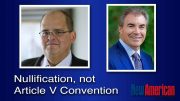
It is commonly believed that a proper function of government is to “level the playing field” by ensuring that the rich pay their “fair share” of taxes, and that the poor and disadvantaged receive extra help from government in the form of subsidies, grants, and “welfare.” (Originally called the “dole,” welfare was given its current name in the 1930s, as a way to sell FDR’s “New Deal” program to the American public. The term was intended to confer constitutional legitimacy, since the preamble proclaims one of the purposes of government to be supporting the “general welfare.” But in reality, “welfare” is just a new name for the dole — the traditional term for using the government in order to rob Peter to pay Paul.) All such policies have as their stated aim creating greater equality. Originally scorned as “the leveling impulse,” wealth redistribution has come to pervade much of what the federal government does.
But is there anything wrong with government “leveling the playing field”? Consider what this practice entails in reality. Whenever government takes from one class of people in order to give to another, it is taking the property of some and giving it to others. The fact that some are wealthier than others is mere sophistry, an argument designed to distract from the real issue of government redistribution: It is theft, pure and simple.
Along with the right to life, the right to property ownership must be deemed among the most important God-given rights conferred upon fallen man. But whereas the people almost always raise an indignant hue and cry whenever government unjustly deprives men of their lives (as, for example, when an officer of the law kills a citizen without just cause, or when government dispatches its military forces to wage war for unjust purposes), the voice of the people tends to fall silent when government commits legal theft (or “legal plunder,” in the phraseology of French economist and statesman Frédéric Bastiat). One reason for this inconsistency is that a life, once taken, cannot be restored, and state-sanctioned murder thus becomes a crime that cannot be ignored. But stolen property can be given to someone else under the false color of social justice, a fact that dishonest politicians have ever taken advantage of to portray their depredations as a form of charity.
Surely, we are told, the rich must “pay their fair share” — which implies that someone in government is possessed of the empyrean wisdom to determine what is fair, how much property is too much, and how much of a man’s assets must be seized and given to others in order to right the scales of justice. Or we are told, like Marxist acolytes, that the government must take from each according to his ability and redistribute to each according to his need. This, again, assumes that there are people somewhere in government who know better than we ourselves do how much we need.
But even if such all-knowing people could be found and depended upon to redistribute money and other assets according to what each of us truly needs and deserves, redistribution remains a form of theft — and theft is never justified, no matter how much the would-be thief may dislike or envy the neighbor who is richer than he.
Government is nothing more (or less!) than collectivized force. It arose in the first place because people agreed to delegate to government certain rights that are often more effectively exercised collectively than individually. One of these, for example, is the right to self-defense. If a person is morally justified in defending himself, his family, and his friends from outside attack, it follows that the government can legitimately do the same. Anything that an individual can licitly do can be delegated by the people to the government.
By the same token, the people cannot delegate to government any authority that individuals do not possess. If individuals have no right to take money and property by force from one neighbor and confer them on another (which they do not!), then government has no legitimate source for its supposed authority to do the same on a society-wide basis.
When this notion — that government does possess this authority, as a result of some vaguely defined collective right — gains too much currency, the very survival of the state comes into doubt. This is because the use of government as an instrument of legal plunder destroys any moral legitimacy the government may have. People rightly come to chafe under the yoke of redistributionist “welfarism,” and eventually decide to become participants in the corrupt system. “Since the government is taking from me to give to others,” goes the rationale, “I might as well get my fair share of the loot from everyone else.” In this way have we built a system utterly dependent on such false public largess; student loans, housing subsidies, research grants, socialized medicine, welfare checks, farm subsidies, and all other forms of government welfare are symptoms of the leveling impulse, and constitute forms of legal plunder great and small.
The great moral ill of our age with respect to property is not that some men have too much of it and some too little, but that our own government, under the guise of fairness, has been converted into a monstrous tool of larceny on a society-wide scale. The proper role of government is to refrain from wealth redistribution, and to encourage policies that encourage the formation of capital. Only thus will the rich get richer — even as the poor get richer, too.



